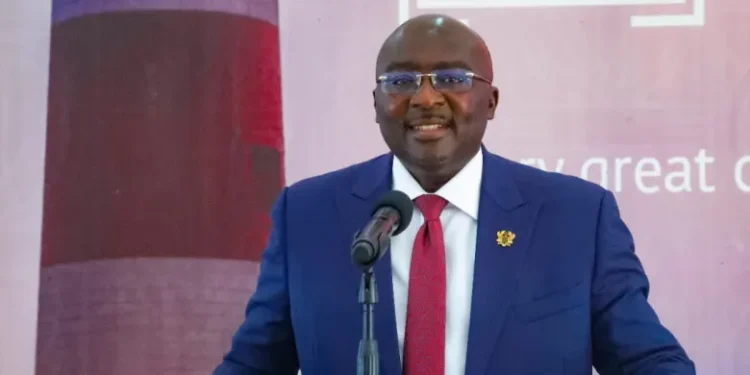The Vice-President, Dr Mahamudu Bawumia, has launched the National Electronic Pharmacy Platform (NEPP) in Accra making the country the first to roll out a national-scale e-pharmacy platform.
The national e-pharmacy platform is a digital convergence of licensed pharmacies across the country, which will enable Ghanaians to have access to prescribed medicines and buy by making an order with a mobile phone through the e-pharmacy app, website or a shortcode, and have the medicine delivered to a requested location
Launching the NEEP, Vice-President Bawumia, expressed delight at the successful execution of the project and the immense benefits it will bring to Ghanaians in the delivery of healthcare.
“I recall with fondness that in 2019, in line with the government’s digitalisation drive, I challenged the Pharmaceutical Society of Ghana to take steps in ensuring that pharmacy services are digitised to ensure prudent regulation of the services provided in the dispensing of medications and other services,” Dr Bawumia said.
“Today’s event is historic for the reason that, for the first time in our nation, we are going to deploy a National Electronic Pharmacy Platform which will enable over 30 million Ghanaians to have access to prescribed medicines in a more convenient, cost-effective and quality assured manner, scaling over counterfeit and inferior medicines.”
The operationalisation of the e-pharmacy platform is such that every drug request entered into the system, is controlled by a team of professionals and registered pharmacists, who, based on the legality and availability of the drug, dispense the medication to the patient in a trust-worthy manner.
This, Dr Bawumia noted, will not only make drugs easily accessible and promote competitive pricing, it will also help reduce the sale of illegal drugs.
“Most often, people are faced with the difficulty of driving quite a distance just to find cost-efficient and reliable pharmacies to purchase medications. The situation most times has led to Pharmacy operators preying on the vulnerability of patients to inflate prices or offer fake substitutes for the medication sought,” the vice-president noted.
He said, “Buying online is easy and convenient. But if you consider buying medicines online, you need to be cautious. Unfortunately, many online shops and Internet platforms sell medicines illegally. If you buy illegal medicines physically or online, at best you risk spending money on something that might have no effect, at worst the medicine has serious side effects or puts your life at risk and may result in even death.”
“The introduction of the National e-pharmacy Platform for short NEPP is meant to safely and securely make available medicines, reduce the burden of cost and save time,” he added.
With the e-pharmacy platform linked to regulatory bodies such as the Food and Drugs Authority, Dr Bawumia added, it will be easier to authenticate medicines and also address other concerns in the delivery of medicine.
“I am particularly impressed that for medication safety, this has been connected to the Food and Drugs Authority database making it easy to authenticate those medicines being sold online are approved for sale in Ghana.”
“The easy access of narcotic and dangerous medicines will be greatly reduced through the effective control of these types of medicines through NEPP.
“This, I believe will among other things address four key concerns in the provision of pharmacy services; reduction in the sale of unlicensed medicines, ensuring confidentiality of health information, privacy of patients’ medical records, and minimizing counterfeit and sub-standard medication in the country.”
The vice-president, who has spearheaded Ghana’s digitalisation drive in many sectors, underscored the significance of adding e-pharmacy to other digital service in the country and its economic potentials to both the pharmaceutical industry and the Ghanaian economy.
“The world today is moving at a pace never imagined before. Even for those who predicted that technology will disrupt the way goods and services move around, they did not envisage it will accelerate this quickly. In this short period, we have witnessed the digital technological transformation in education, retail commerce, building and construction, and more recently in healthcare, since the COVID-19 pandemic struck.”
“In the area of health, the conversation of contactless pharmaceutical service dispensing, has seen e-pharmacy emerge as a promising sector in offering convenience in pharmacy services for all, irrespective of location,” he said.
“The global e-pharmacy market size in 2021 was valued at US$52.0 billion and is expected to grow at a compound annual rate of 19.5% from 2022 to 2030. According to experts, this is due to rising penetration of the internet across the globe, increasing number of tech-savvy consumers, and rising consumer preference for online purchases with a heightened focus on convenience as key factors boosting the market growth.
“With the National Electronic Pharmacy Platform, Ghana will be part of this new pharmaceutical digital economy to boost pharmaceutical sales and generate revenue that can be channelled into research and other medical developments.”
He added, “The increasing adoption of digital technologies and e-commerce especially in the healthcare sector is anticipated to propel overall growth. It is why government finds this platform not only important in linking patients to the approved licensed pharmacies, registered pharmacists, and critical pharmaceutical services but also a critical innovation in safeguarding the future of our youth, providing avenues for job creation, and digital startup business innovations and economic growth,”
The vice-president, commended the Pharmacy Council and other stakeholders involved in ensuring the launch of “this noble initiative.
Present at the launch were: deputy minister of health, Mahama Asei Seini, registrar of the Pharmacy Council Dr Audu Rauf, president of the Pharmaceutical Society of Ghana Samuel Kow, chairperson of the Pharmacy Council, Doris Fosu-Hemaa Addae Afoakwa and representatives from the Ghana Health Service, among others.








